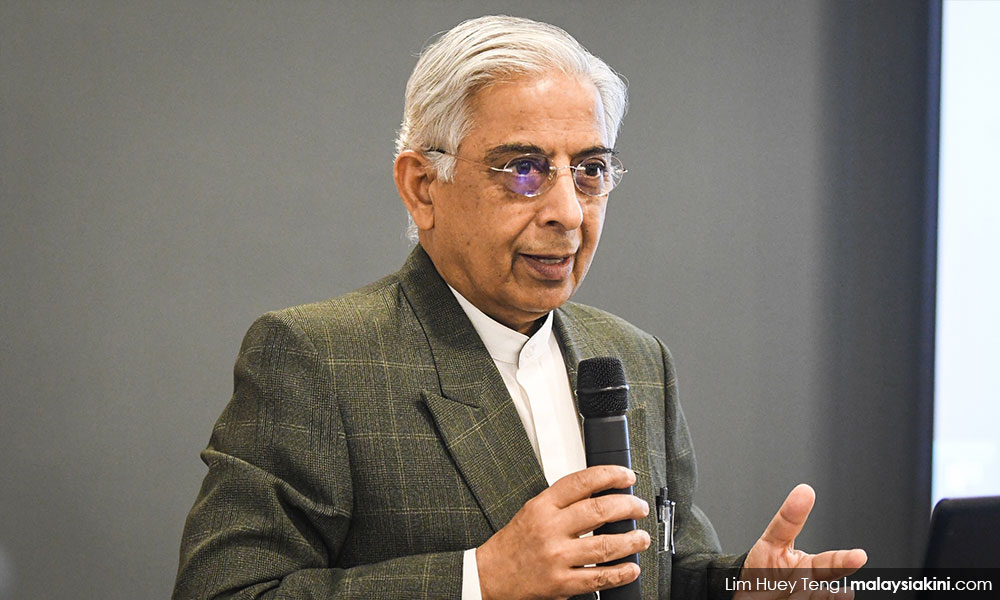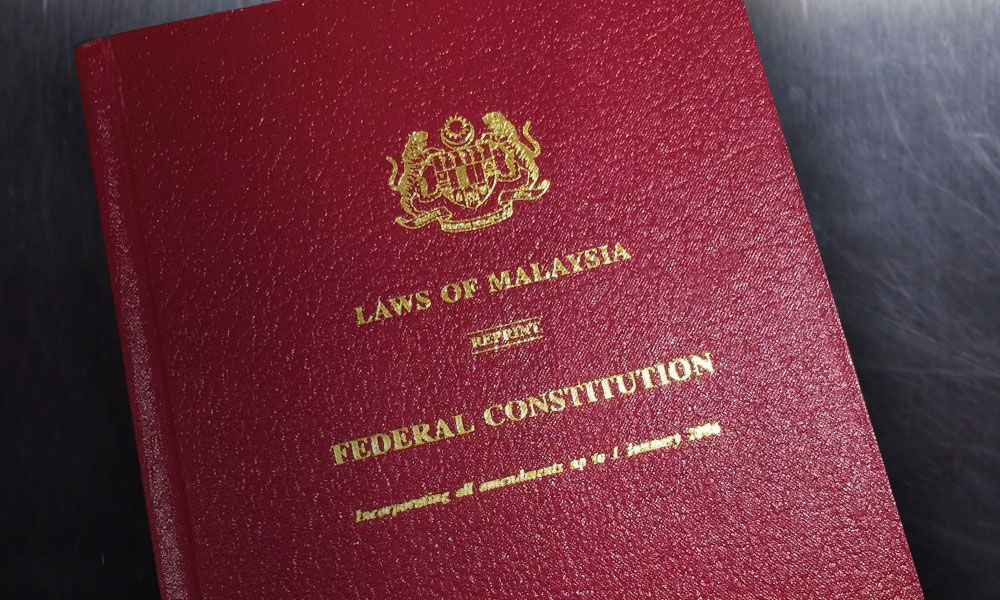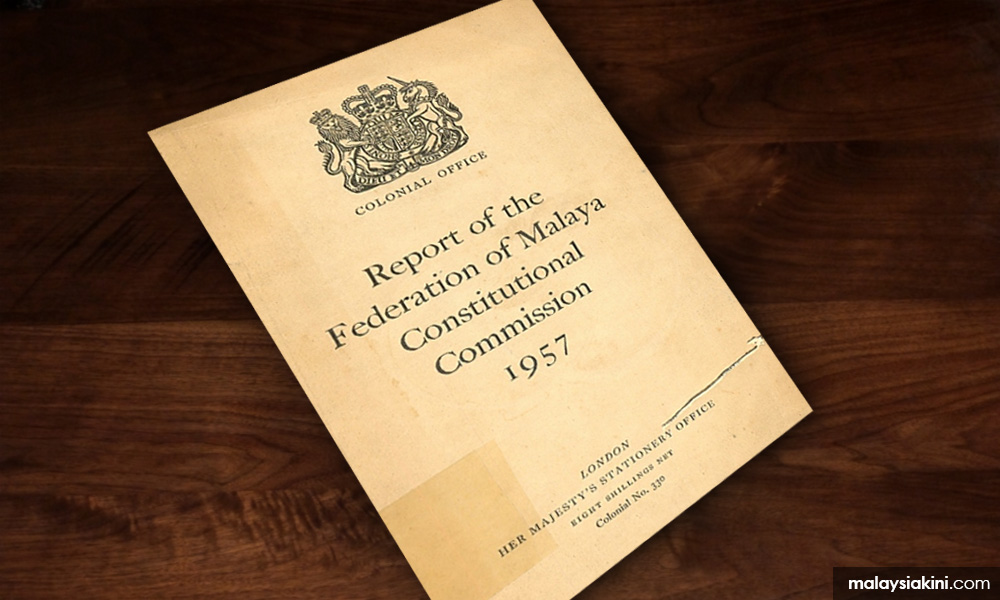On Aug 5, 2023, while answering a question about education quotas during a dialogue with Kolej Matrikulasi Pulau Pinang’s students, Prime Minister Anwar Ibrahim tried to justify the bumiputera quota for higher education seats on the grounds of the so-called “social contract”.
What then is the “social contract” in the context of Peninsular Malaysia?
Who are the parties involved in it and what exactly are its terms?
Is the “social contract” a written agreement specifically spelt out in any document?
Or is it mentioned in the Federal Constitution of Malaysia, the supreme law of the land?
Most Malaysians are unaware of the historical truth and the depth and breadth of the “social contract”.
Worse still, critics argue that it has been “twisted” and “hijacked” by ethnonationalists and religious zealots bent on pursuing a self-serving and divisive agenda detrimental to national unity and the nation’s future wellbeing.
Hence, this article aims to unravel the so-called “social contract”.
The ‘social contract’
It begins by clarifying the term “social contract” and the origins of its usage in the context of Peninsular Malaysia (formerly British Malaya).
The discussion subsequently delves into what exactly constitutes the “social contract”, including the truth about the “special privileges of the Malays”.
Popularised in the eighteenth century by the French philosopher Jean-Jacques Rousseau, the term “social contract” was used in political philosophy.
It refers strictly to a mutual agreement or bargain between the ruled (citizens of a country) and the ruler (the state or whoever holds the reins of power) that defines the rights and duties of each party.
However, in Peninsular Malaysia, the term “social contract” has acquired, or rather, been given different interpretations – depending on whose interests it serves.
Malay dominance
Historically, the term “social contract” in Peninsular Malaysia was first used by the late Umno politician-cum-journalist Abdullah Ahmad in 1986 during a speech in Singapore.
He stated that our country's political system was characterised by Malay dominance which “was born out of a sacrosanct social contract which preceded national independence.”
The term “social contract” is commonly used in academic literature to refer to the “inter-ethnic bargain” between leaders of Umno, MCA, and MIC (forming the Alliance Party) representing the Malays, Chinese, and Indians respectively at the point of independence from British colonial rule.
For example, Tommy Thomas, former attorney-general and a renowned constitutional expert views the “social contract” in essence as a quid pro quo: “In exchange for a place under the Malayan sun with full citizenship, a right to use their language and observe their religion, non-Malays had to concede special privileges to the Malays to assist the latter to ascend the economic ladder.”
Some academicians adopt a broader view of the “social contract” which goes beyond the inter-ethnic bargain.
For instance, Emeritus Professor Shad Saleem Faruqi in his book ‘Document of Destiny: The Constitution of the Federation of Malaysia’ (2008) states that the term “social contract” refers uniquely to “the painstaking compromises between the ethnic Malays, Chinese, and Indians on their mutual rights and privileges and their bargains with the Malay rulers and the British for the creation of a democratic, monarchical, federal and non-theocratic system of government.”

For the record, the term “social contract” was neither used by the Alliance Party’s leaders nor the Reid Commission entrusted with framing the 1957 Federal Constitution.
And it was neither spelt out specifically in any particular document, nor does the term appear in the Malaysian Constitution as it stands today.
Nevertheless, various aspects of the inter-ethnic bargain that our political leaders agreed upon before Malaya’s independence are reflected in the Federal Constitution, including Articles 3, 4, 8, 11,12, 14‒31, 152, and 153.
On the other hand, some critics even question using the term “social contract” to refer to the inter-ethnic bargain.

The late Emeritus Professor Khoo Kay Kim in a BFM Radio talk show on Dec 10, 2010, remarked that drawing reference to the September 1956 Alliance memorandum to the Reid Commission as a “social contract” misuses terminology.
He added that a “social contract” means an agreement between the state and the citizens and not between members of various political parties.
Critics have also argued that the term “social contract” was purely an artificial political construct applied retrospectively or “smuggled” into the inter-ethnic bargain to assert Malay supremacy and remind the non-Malays about the quid pro quo trade-off of citizenship rights for special privileges of the Malays.
Umno invention
According to Mavis Puthucheary, a renowned Malaysian political scientist, the social contract “is an Umno invention to serve an Umno agenda”.
In a similar vein, James Chin, Professor of Asian Studies at the University of Tasmania, has commented: “The idea of the social contract is used every time Malay politicians want to defend discriminatory policies against non-Malays.”

Clive Kessler, Emeritus Professor of Sociology and Anthropology at the University of New South Wales, argued that the “Ketuanan Melayu” political idea was created in the 1980s as if it had been part of the “Merdeka process and agreements” and “that the nation’s non-Malay citizens had thereby consented to accept, and thereafter ever live subject to Malay ascendancy and supremacy.”
Additionally, some groups had sought to use the “social contract” to justify the continuation of preferential policies for the majority bumiputera population beyond the envisaged 20-year initial duration of the Malaysian New Economic Policy 1971‒90.
As cautioned by lawyer Shaikh Saleem, the scope of this inter-ethnic bargain “is being continuously extended that it even prevents any party commenting on the injustices and abuses that are being perpetrated under the guise of ‘enforcing’ this social contract.”
Next, let’s delve into the exact nature of the inter-ethnic bargain regarding the special privileges of the Malays.
The Malay privileges at the time of Malaya’s independence were entirely justifiable as they were meant as a temporary measure to help bridge the economic and social disparities between the Malays and non-Malays.

A little-known fact is that on the eve of Merdeka, the Malays only owned about 1 percent of Malaya’s economy.
For the record, Article 153 originated from the 1948 Federation of Malaya Agreement which required the British High Commissioner to safeguard the special position of the Malays and the legitimate interests of the other communities.
Indeed, during the immediate post-war period, the British colonial government had accorded the Malays special privileges related to Malay land reservation, employment in public services, business permits and licenses, and educational scholarships.
Furthermore, the Alliance Party’s memorandum does highlight the need to protect the “special position of the Malays” arising from the fact that they are the indigenous people of Malaya. As well as by virtue of the several treaties made by sovereign Malay states with the British colonial government.
At the same time, it is important to note that these special Malay privileges were never meant to be in place forever.
Neither should enforcement of the special privileges be unfair and discriminatory towards other ethnic groups.
In this regard, the Alliance party in its memorandum to the Reid Commission stated that “in an independent Malaya all nationals should be accorded equal rights, privileges, and opportunities and there must not be discrimination on the grounds of race or creed.”
A review
Similarly, in their memorandum dated Sept 12, 1956, the Malay rulers further affirmed that they “look forward to a time not too remote when it will become possible to eliminate communalism as a force in the political and economic life of the country.”
The Reid Commission too, in its 1957 report, reiterated that the special privileges for the Malay community were not meant to be a “permanent advantage” over the other communities.
The commission recommended that in due course these privileges “should be reduced and should ultimately cease so that there should then be no discrimination between races or communities.”
Specifically, the Reid Commission based upon the suggestion by the Alliance Party, recommended that after 15 years there should be a review of the Malay privileges and that “the procedure should be that the appropriate government should cause a report to be made and laid before the appropriate legislature; and that the legislature should then determine either to retain or to reduce any quota or to discontinue it entirely.”

Subsequently, the Reid Commission’s Report was reviewed by a tripartite Working Party (British High Commissioner, four Alliance government representatives, four representatives of the rulers, the chief secretary, and the attorney-general) which decided to drop the time frame for a review of Malay special privileges due to strong criticism from the Malays.
The Umno general assembly which met on March 28, 1957 in Kuala Lumpur passed a resolution that there should be no time limit for Malay special privileges.
However, ultimately Umno leaders agreed that “in the interests of the country and in the interests of the Malays themselves” these special privileges of the Malays “should be reviewed from time to time”.
As reiterated by BW Andaya and LY Andaya in their book ‘A History of Malaysia’ (2017), the Malay privileges were “envisaged as a temporary ‘protective measure’ and not as a permanent affirmation of Malay entitlements.”
A similar contemporary, albeit forthright, sentiment is expressed by Dr Abdul Aziz Bari, a constitutional law expert: “The Malays should no longer expect special treatment from the government which should be looking after everybody, especially the taxpayers.”

It is also important to note, as aptly highlighted by Azmi Sharom, a former law lecturer, that the “Malay privileges” are not “Malay rights”.
To paraphrase him, there is no such thing as “racial rights” which are to be given special treatment. There are no “Malay rights” stipulated in the Federal Constitution – there are only terms such as the “special position” of the Malays.
Azmi drives home a critical point succinctly: A “right” implies something inalienable, whereas a privilege is a benefit, presumably given to those who need it.
He adds: “It is inconceivable that discrimination, whether affirmative or not, can be considered a right. It directly contradicts the most fundamental of true rights, equality among all human beings.”
It must be stressed here that in recognition of their “special privileges” by the non-Malays, the Malays were magnanimous in relaxing the citizenship qualifications for non-Malays by accepting the principle of jus soli, but not retrospectively: All children born in the Federation of Malaya on or after Merdeka would be citizens.

The other critical components of the inter-ethnic bargain were that Islam was made the religion of the Federation, but freedom of worship was guaranteed to all creeds; Malay was made the national language whilst English was accepted as the second official language for the next ten years; the Federal Constitution will be the supreme law of the land; and Malaya was meant to be a secular state, and not theocratic.
In summing up, I would urge our younger generations to be taught the real history of our nation to have a sense of national pride, adopt the “spirit of give-and-take”, and instil “a sense of mutual respect” which are vital for Malaysia’s long-term political stability and socioeconomic wellbeing.
Whereas, our political leaders should take heed, as reminded by Andrew Harding in his book ‘The Constitution of Malaysia: A Contextual Analysis’ (2012), Article 153 of the Federal Constitution encompassing the special position of the Malays “is not a licence to ignore the Constitution or the rights of citizens, or to indulge generally in official or institutionalised discrimination.”
The agreed upon “inter-ethnic bargain”, as well as the soul and spirit of our Federal Constitution which promotes inter-ethnic harmony, national unity and socioeconomic equity, must be upheld.
The Alliance Party’s leaders and framers of the Federal Constitution sought to create a secular, pluralistic and multireligious nation. Indeed, the then Malay rulers too were desirous of eventually eliminating discrimination between communities.
Our current national leaders must boldly adopt “A Malaysia for all citizens” outlook per the agreed upon inter-ethnic bargain. They must never allow religious extremists or racist politicians to ruin this beloved nation of ours. - Mkini
RANJIT SINGH MALHI is an independent historian who has written 19 books on Malaysian, Asian, and world history. He is highly committed to writing an inclusive and truthful history of Malaysia based on authoritative sources.
The views expressed here are those of the author/contributor and do not necessarily represent the views of MMKtT.




No comments:
Post a Comment
Note: Only a member of this blog may post a comment.